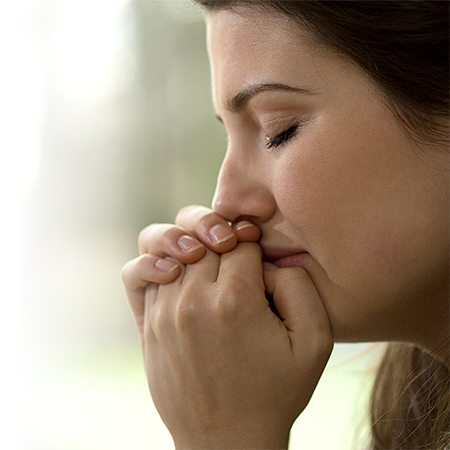We often hear people say "I'm anxious" or "in a panic". What exactly is the difference between anxiousness and anxiety?
Stress
Before discussing about the notions of anxiousness and anxiety, it is important to identify the source: stress. Human beings must face it daily, to different degrees of intensity. Stress is the body's response to the detection of danger. Your brain is your best friend: when it detects a threat, it releases a series of complex biological reactions to warn the body that it is time to react. There are two possible choices open to you: fight or flight.
During a stress response, the body secretes cortisol and adrenaline, which are called "stress hormones". They are responsible for the physical manifestations felt or observed: palpitations, trembling, pallor, goosebumps, sweating, etc. A stress response in itself is normal and healthy; it's excessive stress that causes problems. Exposure to chronic stress can lead to physical and mental health problems.
Bad news, a difficult boss, a late payment, a fender-bender, a turbulent child... Each day, various triggers—sometimes minor, sometimes major—activate your natural stress management mechanisms. Let's see what happens when they are they are overly or too frequently solicited.
Do you want to learn more about stress and how to control it?
Discover our tips right here.
Read the tip
Anxiousness
Anxiety is an abnormal or excessive reaction related to fear, anticipation or apprehension of certain situations or eventualities. It is often characterized by unjustified or unreasonable worrying. It is sometimes described as "fear of fear itself".
For example, an anxious person may overreact to:
- an ordinary situation that would not be perceived as a threat by other people
- a situation that is not real (the person imagines scenarios that have not yet taken place)
- a situation that took place in the past
Everyone is anxious at some point in time, in various circumstances. When people are anxious, they can generally continue their daily tasks, but it can often compromise their well-being and their ability to function properly. Many people are unaware that they are anxious or of the impact that anxiousness has on them and the people around them.
There are a number of ways to learn to better control anxiousness. Professional help is often very beneficial.
Anxiety disorders
There is a world of a difference between normal occasional anxiousness and an anxiety disorder. Some people are prone to anxiety, but this does not mean that they have an illness. Anxiety disorders are real mental illnesses, which require a medical diagnosis in order to confirm them.
People with an anxiety disorder have significant episodes of anxiety (even panic attacks) when they are exposed to certain specific things or situations. This significantly compromises their condition and functioning. They usually tend to avoid these triggers at all costs.
There are several types of anxiety disorders:
- agoraphobia
- social anxiety disorder(or social phobia)
- specific phobia
- panic disorder
- generalized anxiety disorder (GAD)
- etc.
A number of individuals are unaware that they suffer from an anxiety disorder, even though they experience the inconveniences. Consequently, they do not get the help they need, and that is available to them. If you believe you suffer from it, consult a doctor or a psychologist. These professionals have the skills to make a diagnosis and to help you.
Anxiety
Anxiety refers to an occasional experience that is a source of instability that causes an intense psychological and physical reaction. It is characterized by a great sense of loss of control, and panic, by the perception, or clear or imminent danger. The person loses his/her bearings and seems paralyzed, and is momentarily unable to function.
To a certain extent, anxiety is a severe and acute manifestation of anxiousness. During an axiety attack, the following physical symptoms can be felt:
- feeling of suffocation
- feeling of tightness in the throat or chest
- palpitations
- hot flushes
- shaking
- sweats
- tingling sensation (e.g. in the hands)
- etc.
Additionally, people often report:
- a feeling of extreme distress
- a fear of going mad or of dying
- a feeling of being outside of their body or losing contact with reality
A panic attack, like the ones experienced by people who suffer from a panic disorder, is a good example of anxiety. People who suffer from agoraphobia also frequently describe this experience.
Don't hesitate to speak to your pharmacist for additional information about anxiety or anxiety disorders.

